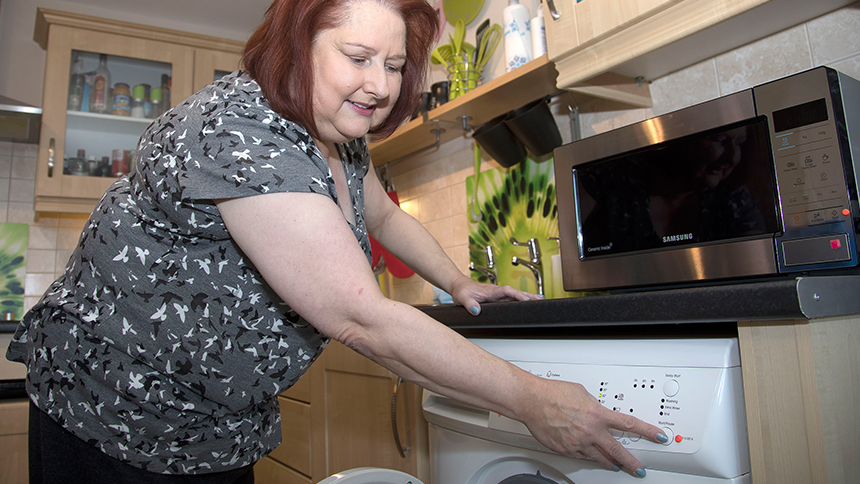Your answers: Making your home more dementia friendly
Talking Point members share advice about making their home more dementia friendly.

naesporran says,
‘I have tried to keep everything free of clutter and I deliberately put a photo of my other half's mum opposite her chair for reassurance when she gets that “wanting to go home” feeling. It has generally worked, though there was a time when she started wondering if her mum was still alive.
‘We are lucky with the layout of our flat in that the toilet is directly opposite the lounge, which reduces the chance of getting lost or wandering. It's also en suite, with another door from the bedroom to keep everything simple.’
Making your home dementia friendly
Read a booklet about practical ways to make your home more dementia friendly.
karaokePete says,
‘I close curtains and turn lights on as soon as daylight starts to fade, as my wife can confuse shadows or reflections with people in the apartment. I leave a hall light on overnight so that there is a crack of light at the bedroom door to make it easier to find and then light to find the bathroom once in the hall.
‘I put stickers on kitchen appliances and remote controls to ease their use. I use a noticeboard in the kitchen to list activities and appointments.
‘My wife, who has Alzheimer's, functions pretty well with these things.’
‘Get an occupational therapist to check out the place. They can make recommendations and often provide free things,' says Beate.
Tin says,
‘To help Mum accept a commode in her bedroom, when not in use there is a Victorian screen around it. Glass and pottery storage jars have been replaced with plastic or metal – pull top rather than screw – with labels of contents all around so, however they are put back, they can still be seen.’
Beate says,
‘Don't regularly change things around too much so as to keep familiarity. Keep clutter to a minimum. Make sure pathways are wide enough and free of obstructions.
‘Colour contrasts are good. White on white might not be seen. Red is a good choice for plates and toilet seats. Keep rooms well lit in the evening and close curtains. Night lights will help too.
‘Reminder tools and clocks only work up to a certain stage – don't get disheartened if they are ignored, and only invest in expensive gadgets if you are certain they will really help.
‘Some people with dementia don't like mirrors as they don't recognise the person looking back at them. Remove or cover them if that is the case.
‘Get an occupational therapist to check out the place. They can make recommendations and often provide free things like grab rails, shower seats or boards, bed levers, wipe-able mattresses, booster cushions, armchairs or small tray tables.’
‘This board has the days of the week, and under each day a little wooden clothes peg,' says maryjoan.
maryjoan says,
‘Just bought a 'Weekly Memo Board' which hangs on the kitchen wall just above where my other half keeps his wallet etc ready for when going out – he cannot miss seeing it.
‘This board has the days of the week, and under each day a little wooden clothes peg. I can then peg a note on the relevant day saying what he has to remember that day. When the pegs are empty he knows he can do as he likes, when there is a piece of paper it is so obvious – not like just writing on a board – he sees it and can also take the note down and put it in his wallet if it is an appointment he has to remember.
‘I bought this in a shop – nothing to do with dementia – but it works really well.’
Countryboy says,
‘To keep our home dementia friendly for myself and family, from the day of my diagnosis with dementia I took positive action and decided to keep my brain active by making the healthy part of the brain compensate for the damaged part.
‘I have a white marker board in the office to write notes, I also keep reminders and notes on the iPad and iPhone.’



Sue gower
saysMy husband has started to wander at night usually looking for the toilet. What canI do?
Hello Sue,
Thank you for getting in touch. We have some helpful pages on the website that explain why a person with dementia may walk about. They also suggest ways to help them walk safely, and how to manage the risks: https://www.alzheimers.org.uk/about-dementia/symptoms-and-diagnosis/wal… This information is also available as a downloadable resource: https://www.alzheimers.org.uk/media/16676 Alternatively, you can request printed versions of our publications to arrive in the post: https://www.alzheimers.org.uk/form/order-free-publications
We would also recommend calling our National Dementia Helpline advisers on 0300 222 11 22 for information and support: https://www.alzheimers.org.uk/get-support/national-dementia-helpline
Additionally, you may benefit from joining our online community, Dementia Talking Point, where people affected by dementia can share their experiences with others in similar situations. Find out more here: https://www.alzheimers.org.uk/get-support/dementia-talking-point-our-on…
We hope this helps.
-
Alzheimer's Society blog team